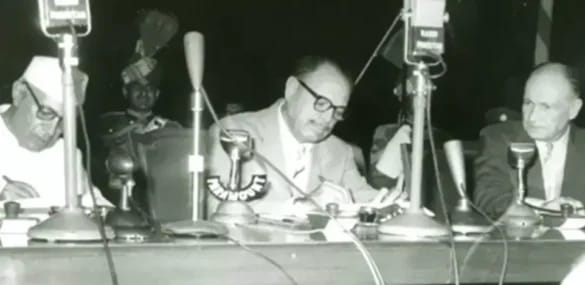For the first time, India has sent a notice to Pakistan asking for a review and revision of the Indus Waters Treaty (IWT). Pakistan has interpreted the move as an attempt by Delhi to unilateral revisions to the treaty that was signed more than 60 years ago, with analysts fearing that India’s ‘desperate’ action might spark another conflict with long-term repercussions for regional stability.
The structural issues involved are extremely sophisticated, as are the mechanisms outlined in the treaty to address them. However, the root problem at play now is that India wants to develop hydroelectric projects on the rivers Indus, Jhelum, and Chenab, but the treaty restricts what India can do with them because it is upstream. Pakistan wants to guarantee that India’s dam plans conform to its understanding of the treaty’s stipulations.
While India’s ultra-Hindu right-wing government led by Prime Minster Narendra Modi has also sought revisions alleging Islamabad’s “intransigence” to comply with the dispute redressal mechanism of the pact, many contend that the decision is more catering to domestic posturing rather than the substance of the treaty. India is arguably pursuing what is known as a “Clausewitzian Grand strategy,” and aiming to use water as a weapon against Pakistan.
India invoking Article XII (3) of the Indus Waters Treaty (IWT) informed Pakistan on January 25 that it intended to amend the provisions of the treaty. Earlier in 2015, Pakistan requested a Neutral Expert to review its technical objections to the Kishanganga and Ratle Hydro Electric Projects (HEPs) but later withdrew the request and suggested that a Court of Arbitration resolve the matter. The World Bank had previously put the processes on hold in 2016 to allow the two countries to explore alternative dispute-resolution methods. However, the processes were resumed in 2022 due to the lack of agreement between Pakistan and India. Later in 2022, the World Bank resumed the two separate processes requested by India and Pakistan concerning the 330MW Kishanganga and 850MW Ratle hydroelectric power plants, as required by its obligations under the Indus Waters Treaty.
India alleges that Pakistan’s withdrawal and the subsequent proposal are a breach of the IWT’s graded mechanism of dispute settlement outlined in Article IX. As a result, India has made a separate request for the matter to be referred to a Neutral Expert. India argues that the simultaneous initiation of two processes on the same issue could result in conflicting outcomes, which could jeopardize the IWT.

One of the key features of the treaty is the establishment of the Permanent Indus Commission, which is responsible for implementing the treaty, resolving disputes, and facilitating the exchange of data and information between Pakistan and India. In addition to the Commission, the treaty provides a dual mechanism for dispute resolution: neutral Expert and Court of Arbitration. The mechanisms have been utilized in the past to resolve disputes regarding the treaty, such as disagreements over hydroelectric projects on the western rivers. IWT is widely regarded as a model for resolving water disputes between riparian as despite occasional tensions and disputes, the treaty has helped to ensure the equitable sharing of the Indus Basin’s waters for over six decades, benefiting populations of both Pakistan and India.
Dual dispute resolution mechanism in the IWT, and the Contentious grading system
IWT stipulates a framework for settling differences and disputes relating to the treaty’s interpretation and application, which categorizes issues as questions, differences, and disputes. Article IX (1) mandates that any question regarding the treaty’s interpretation and application must be considered a breach of the treaty. The Permanent Indus Commission is responsible for resolving it promptly in accordance with the provisions of Article IX. If the Commission is unable to resolve an issue by mutual agreement, it results in a difference. In such cases, the commissioners of either side are responsible for appointing a neutral expert if the difference falls within the scope of Part 1 of Annexure F, subject to Paragraph 2 of Article IX (2). A dispute is deemed to have arisen if Paragraph 2 (a) of Article IX does not cover the difference within its scope or if the Neutral Expert considers it to be treated as a dispute under Article 7 of Annexure F. Such disputes are to be settled in accordance with Provisions 3, 4, and 5 of Article IX.
The parties are directed to appoint neutral experts if a dispute arises and to reach a mutual agreement. If they fail to do so, the World Bank is responsible for appointing a neutral expert. The neutral expert deals with a question only after the Commission has failed to reach an agreement, and the decision is final and binding. Provision 5 of Article IX outlines the role of the Court of Arbitration along with the applicability of provisions in Annexure G. Annexure F of the treaty identifies a 23-point list concerning the scope of the Neutral Expert, and all other issues are to be settled by the Court of Arbitration, barring these points.
The disagreement in the Kishanganga and Ratle dam cases began with India’s claim that the issue did not qualify as a ‘dispute’ and accused Pakistan of violating the procedure outlined in the treaty. India argued that Pakistan should have first requested a neutral expert to determine whether the issue was a ‘difference’ or a ‘dispute’ before bringing it to a Court of Arbitration. It is unclear whether the graded mechanism or the parallel process approach is the better approach, as the parties have used different methods to resolve their disputes in three cases. In the Salal Dam case, the parties considered it a ‘question’ and resolved it bilaterally. In the Baglihar Dam case, they viewed the issue as a ‘difference’ and used a neutral expert to resolve it. Finally, in the Kishanganga case, the Court of Arbitration determined that both countries were involved in a ‘dispute’ that needed to be settled.
India’s motives for revisiting the treaty; Concerns for Pakistan
India’s Modi-led BJP-RSS hybrid government has been following a Clausewitzian Grand strategy that integrates various political tools, such as diplomacy, economics, and warfare, into a unified view of state policy. This approach is strategically focused and seeks to achieve the state’s objectives at all costs. The core group of the present regime includes India’s most powerful personalities within the regime, Amit Shah, Rajnath Singh, Nirmala Sitharaman, and Ajit Doval, who have promoted an aggressive Hindu political identity. They have utilized Hindutva and national identity issues to foster unity among their supporters and to further anti-minority and anti-Pakistan sentiments in society. Those who oppose their political ideology are often targeted and accused of treason and even face physical violence. This anti-minority, anti-Pakistan strategy has been criticized by some as being a form of fascist hate propaganda.
India has been considering revisiting or revoking the Indus Waters Treaty (IWT) with Pakistan, which regulates the use of six rivers shared by the two countries. The main reason behind India’s motive to take such a step is to exert pressure on Pakistan, as water stoppage or diversion could have severe consequences for Pakistan’s agrarian economy, which depends on these rivers. India’s intentions to use water as a weapon against Pakistan have been evident from the statements of Indian parliamentarians, who have called for revoking the treaty as a means of waging a cheap and inoffensive war.
Not only the Indian Parliament, but the Legislative Assembly of the former semi-autonomous state Jammu and Kashmir have also called for revoking the treaty. Farooq Abdullah the then Chief Minister of the erstwhile state in 2002 argued that while drafting the treaty, the interests of Kashmiris were overlooked, and its revocation was in the best interest of the people of the state. After the revocation of Article 370, Indian parliamentarians, including Home Minister Amit Shah, have proclaimed to annex and capture Pakistan-administered Kashmir and Gilgit Baltistan. Some sceptics among the academia and political circle’s view this as part of India’s expansive agenda to sabotage the waters of the Western Rivers.
The Modi-led administration formed an inter-ministerial task force in 2016 to review strategic aspects of the IWT with Pakistan, which was headed by Narendra Modi’s Principal Secretary and included NSA Ajit Doval and India’s MEA S Jaishankar. In the first meeting of the task force, Modi asserted that “blood and water can’t flow together,” and the task force indicated that India could even consider walking out of the IWT alleging Pakistan of supporting the armed struggle in Kashmir. India reiterated its plan to stop sharing water with Pakistan after the Pulwama attack, with Nitin Gadkari the then transport and water resources minister announcing that the country would divert water from eastern rivers to supply its people in Jammu and Kashmir and Punjab states.
India’s increasing water demands, as a result of climate change implications, is another reason for India to revoke the treaty. A World Bank water report estimates that by 2025, India would become water stressed, with a significant decrease in per capita water availability. The report estimates that by 2025 India would become water stressed, as the per capita water availability is estimated to decrease from 5000 cubic meters per annum in 1947 to 1100 cubic meters per annum in 2019. All indicators suggest a shortage of water availability in India in the near future. India has accorded high priority to water security, as manifested by the speeches of successive prime ministers in the last decade or so. India has set its sights on the Western Rivers, and although no official document suggests so, India’s actions and initiation of a veritable caravan of projects on western rivers manifest this possibility.
Pakistan has responded on several occasions that if India were to revoke the Indus Water Treaty or interfere with the water flow into Pakistan, it would be viewed as a hostile act and a violation of the treaty. Such actions could set a precedent under regional state practice that could lead to a breach of international law. It could also provide China the upper riparian with a justification to consider the suspension of waters of the Brahmaputra and the Jhelum rivers.
Conclusion
India’s bid to unilaterally revisit or revoke the IWT with Pakistan poses a significant threat to the stability of the region. The treaty, which has been in place since 1960, has successfully maintained the distribution of water between India and Pakistan, despite several instances of armed conflict between the two contiguous states. However, India’s increasing water demands, climate change implications, and a desire to pressurize Pakistan have led to its bid to revisit the treaty. The use of water as a weapon by India could have disastrous consequences for Pakistan, as millions of people would suffer due to the drying up of their crops and water sources. Furthermore, the revocation of the treaty could lead to an increase in armed conflicts between the two nations, resulting in a destabilized region and potential humanitarian crisis.
The situation in Kashmir and Pakistan’s inaction has further emboldened India to push its expansionist agenda westward. The revocation of Article 370 and the subsequent claims to annex Pakistan-administered Kashmir and Gilgit-Baltistan, is a clear indication of India’s intentions to expand its territorial control. It is imperative that the international community takes notice of India’s aggressive tactics, and pressurizes it to uphold the Indus Waters Treaty, which is crucial for the stability in the region. Any attempt to use water as a weapon or destabilize the region could have far-reaching consequences that could impact the lives of millions of people.






